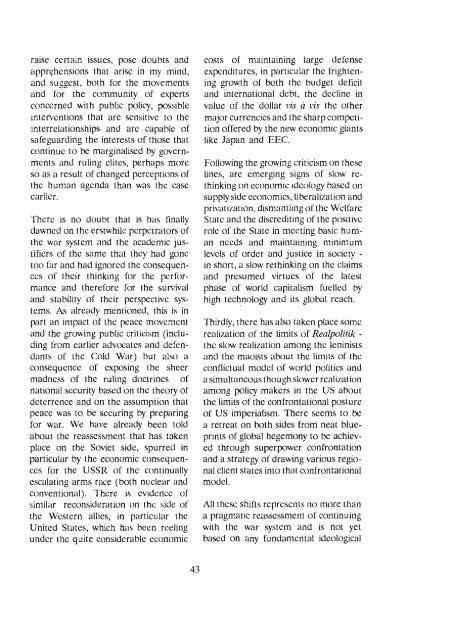ifda dossier 74 - Dag Hammarskjöld Foundation
ifda dossier 74 - Dag Hammarskjöld Foundation
ifda dossier 74 - Dag Hammarskjöld Foundation
Create successful ePaper yourself
Turn your PDF publications into a flip-book with our unique Google optimized e-Paper software.
aise certain issues, pose doubts and<br />
apprehensions that arise in my mind,<br />
and suggest, both for the movements<br />
and for the community of experts<br />
concerned with public policy, possible<br />
interventions that are sensitive to the<br />
interrelationships and are capable of<br />
safeguarding the interests of those that<br />
continue to be marginalised by govern-<br />
ments and ruling elites, perhaps more<br />
so as a result of changed perceptions of<br />
the human agenda than was the case<br />
earlier.<br />
Fhere is no doubt that is has finally<br />
dawned on the erstwhile perpetrators of<br />
the war system and the academic jus-<br />
tifiers of the same that they had gone<br />
too far and had ignored the consequen-<br />
ces of their thinking for the perfor-<br />
mance and therefore for the survival<br />
and stability of their perspective sys-<br />
tems. As already mentioned, this is in<br />
part an impact of the peace movement<br />
and the growing public criticism (inclu-<br />
ding from earlier advocates and defen-<br />
dants of the Cold War) but also a<br />
consequence of exposing the sheer<br />
madness of the ruling doctrines of<br />
national security based on the theory of<br />
deterrence and on the assumption that<br />
peace was to be securing by preparing<br />
for war. We have already been told<br />
about the reassessment that has taken<br />
place on the Soviet side, spurred in<br />
particular by the economic consequen-<br />
ces for the USSR of the continually<br />
escalating arms race (both nuclear and<br />
conventional). There is evidence of<br />
sinlilcir reconsideration on the side of<br />
the Western allies, in particular the<br />
United States, which has been reeling<br />
under the quite considerable economic<br />
costs of maintaining large defense<br />
expenditures, in particular the frighten-<br />
ing growth of both the budget deficit<br />
and international debt, the decline in<br />
value of the dollar vis a vis the other<br />
major currencies and the sharp competi-<br />
tion offered by the new economic giants<br />
like Japan and EEC.<br />
Following the growing criticism on these<br />
lines, are emerging signs of slow re-<br />
thinking on economic ideology based on<br />
supply side economics, liberalization and<br />
privatization, dismantling of the Welfare<br />
State and the discrediting of the positive<br />
role of the State in meeting basic hum-<br />
an needs and maintaining nlinin~um<br />
levels of order and justice in society -<br />
in short, a slow rethinking on the claims<br />
and presumed virtues of the latest<br />
phase of world capitalism fuelled by<br />
high technology and its global reach.<br />
Thirdly, there has also taken place some<br />
realization of the limits of Realpolitik -<br />
the slow realization among the leninists<br />
and the maoists about the limits of the<br />
eonflictual modcl of world politics and<br />
a simultaneous though slower realization<br />
among policy makers in the US about<br />
the limits of the confrontational posture<br />
of US imperialism. There seems to be<br />
a retreat on both sides from neat blue-<br />
prints of global hegemony to be achiev-<br />
ed through superpower confrontation<br />
and a strategy of drawing various regio-<br />
nal client states into that confrontational<br />
model.<br />
Ail these shifts represents no more than<br />
a pragmatic reassessment of continuing<br />
with the war system and is not yet<br />
based on any fundan~ental ideological
















